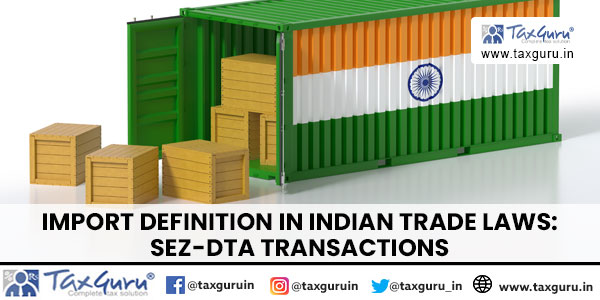Decoding the Definition of “Import” in Indian Trade Laws: Analyzing Its Applicability to SEZ-DTA Transactions
Introduction:
The concept of “Import” holds paramount importance in trade, taxation, and regulatory frameworks. Its definition determines the applicability of various statutes, including the Foreign Trade Policy (FTP), Customs Act, and the Special Economic Zones (SEZ) Act, 2005. A long-standing question in Indian trade jurisprudence pertains to whether the movement of goods from an SEZ to the Domestic Tariff Area (DTA) qualifies as an “Import” for the purposes of FTP.
The treatment of SEZs as distinct economic territories creates a complex legal scenario. While SEZs are physically located within India, they enjoy extra-territorial status for trade and customs purposes. The movement of goods from SEZ to DTA is subject to customs duties akin to imports, yet whether such a transaction meets the statutory definition of “Import” remains a crucial point of legal interpretation.

This article critically examines the legal definitions of Import across various legislations, analyzing their implications for SEZ-DTA transactions. By evaluating the legislative intent, judicial precedents, and the fundamental principles of trade policy, this article provides a comprehensive legal perspective on why DTA clearances from SEZs do not qualify as “Import” under FTP despite the levy of import-equivalent duties.
Understanding India’s Foreign Trade Policy (FTP) and Its Import Framework:
1. The Policy Regime on Imports and Exports
India’s Foreign Trade Policy (FTP), issued under the Foreign Trade (Development & Regulation) Act, 1992 (FTDR Act), provides the foundational framework for imports and exports. Para 2.01 of FTP lays down the import policy as follows:
(a) Exports and Imports shall be ‘Free’ except when regulated by way of ‘Prohibition’, ‘Restriction’, or ‘Exclusive trading through State Trading Enterprises (STEs)’ as laid down in the Indian Trade Classification (Harmonized System) [ITC (HS)] of Exports and Imports. The list of ‘Prohibited’, ‘Restricted’, and STE items can be viewed under ‘Regulatory Updates’ at https://dgft.gov.in.
(b) Further, there are some items that are ‘Free’ for import/export but are subject to conditions stipulated in other Acts or in law for the time being in force.
This policy underscores the principle that international trade is largely unrestricted unless specifically controlled through regulatory mechanisms.
2. Definition of Import Under FTDR Act
The Foreign Trade (Development & Regulation) Act, 1992 (FTDR Act), is the primary legislation governing foreign trade in India. Section 2(e) of the FTDR Act defines “import” and “export” as follows:
(e) “import” and “export” means,—
(I) in relation to goods, bringing into, or taking out of, India any goods by land, sea or air;
(II) in relation to services or technology,—
(i) supplying, services or technology—
(A) from the territory of another country into the territory of India;
(B) in the territory of another country to an Indian service consumer;
(C) by a service supplier of another country, through commercial presence in India;
(D) by a service supplier of another country, through presence of their natural persons in India;
(ii) supplying, services or technology—
(A) from India into the territory of any other country;
(B) in India to the service consumer of any other country;
(C) by a service supplier of India, through commercial presence in the territory of any other country;
(D) by a service supplier of India, through presence of Indian natural persons in the territory of any other country:
Provided that “import” and “export” in relation to the goods, services, and technology regarding Special Economic Zones or between two Special Economic Zones shall be governed in accordance with the provisions contained in the Special Economic Zones Act, 2005 (28 of 2005).
The definition makes it clear that for goods, import means bringing them into India from a location outside India.
3. Definition of Import Under SEZ Act
The Special Economic Zones (SEZ) Act, 2005, being a special law, provides its own definition of “Import.” As per Section 2(o) of the SEZ Act:
“import” means-
(i) bringing goods or receiving services, in a Special Economic Zone, by a Unit or Developer from a place outside India by land, sea, or air or by any other mode, whether physical or otherwise; or
(ii) receiving goods, or services by, Unit or Developer from another Unit or Developer of the same Special Economic Zone or a different Special Economic Zone.
Thus, under the SEZ framework, “import” also covers transactions where goods are received within an SEZ from another SEZ, even though both are located within the national boundaries of India.
Analysis: Whether DTA Clearance from SEZ Qualifies as “Import”
A key question that arises in trade and taxation jurisprudence is whether the movement of goods from an SEZ to the Domestic Tariff Area (DTA) qualifies as an “Import” under FTP and FTDR Act.
1. SEZ as a Distinct Jurisdiction
SEZs are considered foreign territories for the purpose of trade, taxation, and regulatory policies. This treatment is in line with the objective of SEZs, which is to provide a duty-free regime and a globally competitive environment for export-oriented industries.
2. Import Requires Goods to Come from Outside India
The definition of “Import” under the FTDR Act, 1992 clearly states that goods must be brought into India from outside India. Since an SEZ is physically located within India, the movement of goods from an SEZ to the DTA does not satisfy this condition.
3. Treatment of SEZ-DTA Transactions Under Customs Law
When goods move from an SEZ into the DTA, they are subjected to Customs duties equivalent to import duties. However, this does not mean that such a transaction qualifies as “Import” under FTP. The levy of duties is a fiscal measure to prevent duty-free goods from entering the domestic market without payment of taxes.
4. Legislative Intent and Policy Interpretation
The proviso to Section 2(e) of the FTDR Act makes it explicit that import/export transactions involving SEZs shall be governed by the SEZ Act, 2005. This reinforces the idea that SEZ transactions are treated differently from conventional international trade transactions.
Therefore, while SEZ-DTA clearances attract customs duties equivalent to imports, they do not fall within the definition of “Import” under the FTP.
Conclusion:
A careful analysis of the definitions under the FTDR Act, FTP, and SEZ Act reveals that:
- Import refers to the entry of goods into India from outside India.
- SEZs are treated as separate trade jurisdictions, but they are still within India’s geographical boundaries.
- Movement of goods from an SEZ to DTA is not “Import” under the FTP, though such transactions are subject to customs duties akin to import duties.
- Thus, for the purposes of FTP and the Import Policy, a transfer of goods from SEZ to DTA is not considered an “Import” and is instead governed by the specific provisions of the SEZ Act and Customs Laws. Hence the restrictions as imposed if any under Import Policy would not be applicable to such transactions.
- The SEZ Act governs SEZ-related transactions, reinforcing the distinct treatment of SEZ trade.
The distinction between legal Import under FTP and fiscal Import under Customs Law is critical for businesses, trade policy makers, and tax authorities to ensure accurate classification and compliance. Given the ongoing evolution of trade laws, clarity on this matter remains essential to prevent regulatory misinterpretation and ensure a seamless trade ecosystem.
*****
Disclaimer: The views expressed in this article are based on the author’s interpretation of the relevant legal provisions and trade policies. While every effort has been made to ensure accuracy, this analysis is subject to alternative perspectives and judicial interpretations. Readers are advised to consult the applicable laws, regulations, and professional advisors before making any trade or compliance decisions.





